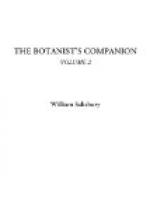639. Conium maculatum. Hemlock.—Two soldiers quartered at Waltham Abbey collected in the fields adjoining to that town a quantity of herbs sufficient for themselves and two others for dinner when boiled with bacon. These herbs were accordingly dressed, and the poor men ate of the broth with bread, and afterwards the herbs with bacon: in a short time they were all seized with vertigo. Soon after they were comatose, two of them became convulsed, and died in about three hours.
Plantae affines.
Parsley differs from this except in size and colour of the leaves.
Celery is also much like this plant, and particularly so if found wild; but which, for reasons given before, should never be collected to be eaten.
Fool’s parsley is very like it; and when the hemlock is in a small state, and this plant luxuriant, I have been in some doubt as to pointing out a perfect difference, especially when they are not in fructification. The spots on hemlock form generally a distinguishing mark.
640. Digitalis purpurea. Foxglove.—A few months ago, a child was ill of a pulmonary complaint, and the apothecary had desired the nurse to procure a small quantity of Coltsfoot and make it a little tea; and accordingly the good woman went to a shop in London, where she procured, as she supposed, three pennyworth of that herb, and made a decoction, of which she gave the patient a tea-cupful; a few minutes after which she found symptoms of convulsions make their appearance, and sent for the apothecary: but who, unfortunately, was so totally ignorant of botany as not to know the plant, but supposing it to be Coltsfoot, after the infant died, took his leave, without ay remark further, than that the disorder which occasioned its death had arisen from some accidental and unusual cause. The nurse, however, did not feel perfectly satisfied of this fact, and carried the remainder of the herb to Apothecaries-Hall; and having applied there for information, was referred to Mr. Leffler, a gentleman who had from his botanical researches that season obtained the Sloanean prize; who told her the mistake. He also went and saw the body, and investigated the whole case in a way that has done that young gentleman great credit; and from him I have been favoured with this account. Had the medical attendant but known the difference between the two plants when he was called in first, there was a chance of the child being saved to its distressed parents. And here was certainly a striking instance of medical men neglecting so far the study of botany, as not to know one of the most useful as well as one of the most dangerous plants of the present Pharmacopoeia.
641. Helleborus foetidus. BEARSFOOT.—The country-people are in the habit of chopping up the leaves of this plant and giving it to children for removing worms; but it is a dangerous medicine, and should be made use of with great caution. It is also recommended as a medicine for the same purpose in horses. As much of the chopped leaves as will lie on a crown-piece, given amongst a feed of corn for three days, and remitted three days, and repeated thus for nine doses, has been known to remove this disease.




